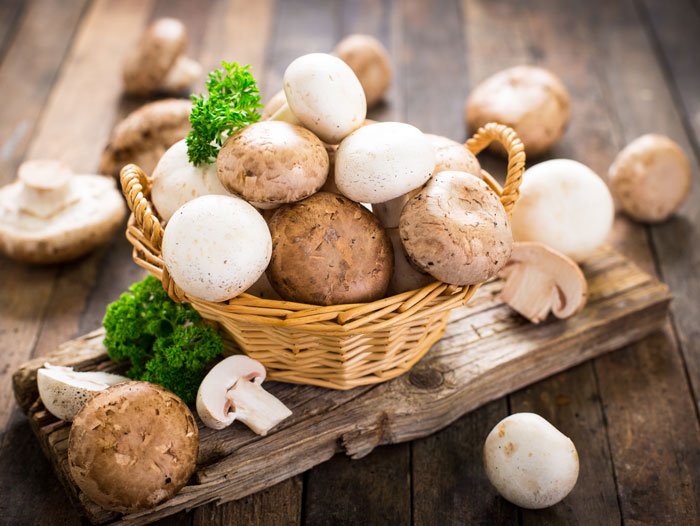U.S. Department of Agriculture Designates September National Mushroom Month
September 5, 2019 | 4 min to read

Avondale, PA – In soup, on a pizza, stuffed, sautéed, or sliced, mushrooms are increasingly taking a starring role on consumers’ plates. With so much to love about mushrooms, it’s no wonder the U.S. Department of Agriculture designated September as National Mushroom Month.
By Proclamation, signed by Agriculture Secretary Sonny Purdue, mushrooms are recognized for their “nutritional value and other outstanding attributes.” The Proclamation also encourages “greater appreciation and use of mushrooms.”
Economic Impact
“Those mushrooms you find in the produce aisle pack a big financial punch, with an economic impact in the United States of $3.1 billion through sales of all mushrooms, supplies, and other related spending,” said American Mushroom Institute President Rachel Roberts.
Mushroom sales alone generated more than $1.2 billion in impact in 2017. The diverse inputs for mushroom production – spawn, casing, and compost – generated an additional $300 million in impact that year. From those sales, the mushroom industry generated an additional $1.5 billion in indirect and induced spending, for a total impact of more than $3.1 billion.
The mushroom industry supports thousands of jobs throughout the economy. In Pennsylvania, which produces nearly two-thirds of U.S. mushrooms, the industry supports 8,600 jobs with $287 million in employee compensation. Nationally, the industry supports 21,000 jobs with $864 million in wages.
For more information on the economic impact of mushrooms, visit https://bit.ly/2kt3Cin.
Nutrition
Mushrooms provide many of the same nutritional benefits as vegetables as well as attributes commonly found in meat, beans, and grains. “Mushrooms are the superhero of the produce aisle, available in a variety of tastes and textures, packed with powerful nutrients and contain no cholesterol or fat,” Roberts explained. “They have more protein than most vegetables, are the only food in the produce aisle that have lots of naturally occurring vitamin D, have proportionally more potassium than bananas, and study after study is coming out about their benefits to cognition and disease-fighting. And, they’re available in fresh, dried, and powder form so you can get a daily dose no matter your palette preference.”
For more information on mushroom nutrition, visit https://bit.ly/2jXEeRD.
Sustainability
In agriculture, mushroom growers are known as the ‘ultimate recyclers.’ From the beginning of the process – compost preparation – to post harvest, mushroom farmers are great stewards of the earth, using and reusing the natural materials needed to grow mushrooms. Because of this recycling of other agricultural crops and byproducts, mushroom farms have a smaller environmental footprint than almost any other farms, making it Earth Day every day in the mushroom industry.
“When you go into the store and see white or brown “button” mushrooms, you are looking at an incredibly efficient food,” explained Roberts.
Mushrooms:
- Use less than two gallons of water to grow, harvest, and process an entire pound of mushrooms, compared with an average of 50 gallons of water per pound of other fresh produce items.
- Are also a lower energy footprint crop. Producing one pound of button mushrooms takes 1.0-kilowatt hour (kwh) of electricity. This is the same amount of energy (1 kwh) it takes to run a coffeemaker for one hour each day!
- Generate just 0.7 pounds of CO2 equivalents. To give some perspective of how small a carbon footprint that is, using one gallon of fuel in the U.S. emits nearly 20 pounds of CO2.
- Have a small physical footprint. One acre of land with a mushroom growing house can produce 1 million pounds of mushrooms each year. Put another way, one acre of land can produce enough mushrooms to fill the length of nearly 4,700 football stadiums.
- Are gaining popularity in environmental remediation usage. The soils that mushrooms are grown in are not only great for gardens and food crops, but have been used as mine and spill reclamation projects.
- Have other incredible abilities through their mycelium, including producing leather-like fabric that the fashion industry is paying top dollar for. Just Google mushrooms!
For more information on sustainability, visit https://bit.ly/2lvPzbW.
# # #
About AMI
The American Mushroom Institute (AMI), headquartered in Avondale, Pennsylvania, is a national voluntary trade association representing the growers, processors and marketers of cultivated mushrooms in the United States and industry suppliers worldwide. For more information, visit www.americanmushroom.org.
